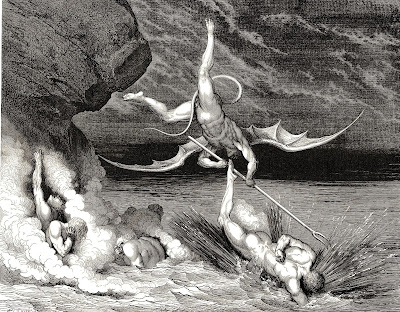 |
| An image of bribery from Eighteenth Century England |
The malebranche, both terrifying and humorous, in an off-color manner, soar about the tarpit with pitchforks in hand looking to skewer any sinner that dares to show his flesh. One poor soul, from Lucca, does just that and meets with both the devils' hooks and their humor as they compare the sinner's attempt to float on the pitch to the Santo Volto ("Holy Face," an important devotional crucifix, said to have been craved by Nicodemus, in Lucca) and remind him, while pulling him apart, that swimming in Hell isn't like swimming in the Serchio (the primary river near Lucca).
 |
| Santo Volto of Lucca |
... his arrogance so humbled in him,The devils explain that the arch-bridge over this bolgia was destroyed, "yesterday, five hours later than this hour, / One thousand and two hundred sixty-six / Years"(XXI:112-114) ago by the Harrowing of Hell, which also destroyed the entrance gate to Hell and created the rockslide on which we met the Minotaur. As each bolgia has several bridges across it, Dante and Virgil must content themselves with following the devils to the next crossing, which Malacoda reveals is still intact (remember Virgil last passed through here before the Harrowing of Hell, before the bridge was destroyed). Dante, none too enthused with his new traveling companions, sidles up next to Virgil as Malacoda "made a trumpet of his rump" (XXI:139), as the signal to set off.
That he let fall his grapnel at his feet,
And to the others said: "Now strike him not." (XXI:85-88)
On the journey to the next bridge, the Malebranche come across a group of sinners that dare to have their faces slightly above the pitch. Most of them immediately duck back under at the approach of the devils, but one doesn't get away in time and is hoisted out by the demon guards. The other devils cry out,
"O Rubicante, see that thou do layVirgil interrupts the torment of this sinner to discover his name, he never gets to (though early commentators identify the man as Ciampolo), and to learn of anyone else that might be beneath the surface. The captured sinner, who we learn only is from the Kingdom of Navarre, uses the opportunity of speaking with Virgil to leap from the claws of the Malebranche striving to return to the relatively safety of the boiling tar. Seeing the Navarrese leap toward the pitch, Alichin, another devil, flies off to capture the sinner before he makes his escape, but misses as, "wings could not / outstrip the fear" (XXII:128-129) of the sinner.
Thy claws upon him, so that thou mayest flay him," (XXII:40-41)
 |
| Therefore he moved, and cried out: "Thou art o'ertaken." (XXII:126) |
While the devils are betrayed by Ciampolo and while they battle one another, Dante and Virgil decide to press ahead by themselves to the next bridge. Dante is more fearful now of the devils than ever,
..."These on our account
Are laughed to scorn, with injury and scoff
So great, that much I think it must annoy them....
I am in dread; we have them now behind us;No sooner is this said than that the Malebranche appear on the horizon, wings spread, pitchforks in hands. Virgil grabs Dante and slides down the rocky side of the bolgia, just as the devils reach them.
I so imagine them, I already feel them." (XXIII:13-15; 23-24)
 |
| ... there was nothing to fear; for that High Providence that willed them ministers of the fifth ditch, denies to all of them the power to leave it. (XXIII:54-57, Mandelbaum) |
... "This transfixed one, whom thou seest,
Counselled the Pharisees that it was meet
To put one man to torture for the people.
Crosswise and naked is he on the path,
As thou perceives; and he needs must feel,
Whoever passes, first how much he weighs;
And in like mode his father-in-law is punishedto be an incidence of hatred for the Jews, however I think the exact opposite is proven here. Dante bemoans the fate of Jerusalem and God's Holy People (the destruction of the Temple, the Sack of Jerusalem, and the diaspora), by showing how severely the leaders who caused these evils to be listed on the people are punished in the pit of Hell. We see nowhere in Dante the damnation of all Jewish people, in fact many of the Old Testament figures (and, of course, the Jewish New Testament saints and Christ Himself) enjoy Paradise. It is the parties responsible among the First Century Jewish leadership that are here punished, not all Jews indiscriminately.
Within this moat, and the others of the council,
Which for the Jews was a malignant seed." (XXII:115-123)
The canto ends with Virgil livid over realizing that the malebranche had lied to him about the broken archway bridge. All the bridges over the fifth bolgia, it turns out, were shattered when Christ entered Hell, including the one Malacoda and company were leading Virgil and Dante to. On this fraudulent note, Virgil and Dante walk off to try to find some way out of the sixth bolgia.
No comments:
Post a Comment